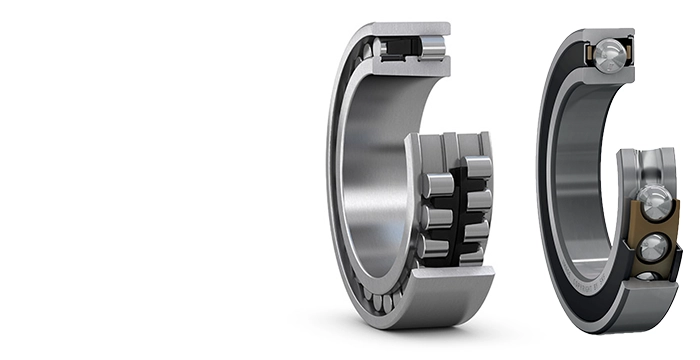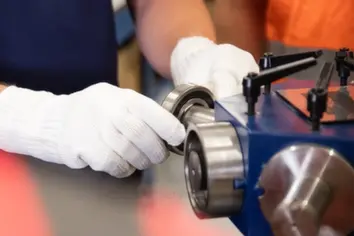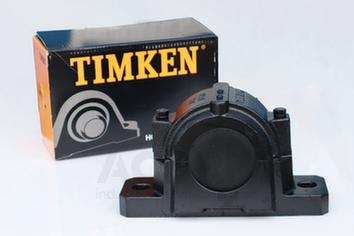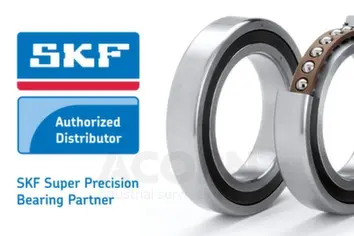Precision bearings are critical components in various high-performance and high-accuracy applications across multiple industries. These bearings are engineered to meet stringent standards of precision, reliability, and durability, making them indispensable in environments where even the smallest deviations can lead to significant issues.
Here at ACORN®, we stock a wide range of precision bearings from the industry's leading manufacturers. If you're unsure of the precision bearing your application needs, you can contact our expert team who will be happy to help

These bearings are engineered to very tight tolerances to ensure minimal runout and consistent motion. The precision of the bearing is specified by the progressive number in a bearings tolerance class. For ISO standards, the higher the number the higher the bearing precision. However, with DIN standards the lower the number the higher the bearing precision.
Precision bearings are made from high-grade materials with advanced heat treatments and coatings for wear resistance. They are designed to withstand harsh environments including high speed, loads, and temperatures.
These bearings are optimised to reduce vibrations and noise beyond standard bearings
Ball Bearings:
Roller Bearings:
Thrust Bearings:
Needle Bearings: These bearings have a high length-to-diameter ratio and are used in applications where space is limited but high load capacity is required.
Hybrid Bearings: These bearings use ceramic balls instead of steel balls, offering advantages such as lower weight, higher speed capabilities, and better performance in high-temperature environments.
Reliability - Consistent performance under heavy loads and high speeds
Long service life - Resistant to wear and deformation even in harsh environment applications
Enhanced system performance - Ensures stability and precision in motion-critical applications
Precision bearings are critical components in various applications where high accuracy, reliability, and performance are essential. Here are some common applications of precision bearings:



Yes, precision bearings are designed to handle high-speed applications. Hybrid bearings with ceramic balls are particularly suitable for high-speed environments due to their lower weight and higher speed capabilities.
Consider the following factors:
Precision bearings can be purchased from specialised bearing suppliers, industrial distributors, and manufacturers. It's essential to choose a reputable supplier to ensure the quality and reliability of the bearings.
For more information or specific enquiries about precision bearings, feel free to contact Acorn Industrial Services UK or visit our website.
High running accuracy
High-speed performance
High system rigidity
Minimise vibration
Minimise noise
Minimise friction
Can be customised for your application's needs
Choosing the right SKF precision bearing depends on several factors, including load capacity, speed, precision requirements, and environmental conditions. Get in touch with us today to find the correct precision bearing for your application's needs
SKF's advanced coatings, such as NoWear, enhance wear resistance, reduce friction, and extend bearing life. These coatings are particularly beneficial in demanding applications where standard bearings may not perform adequately.
Proper maintenance, including regular lubrication, monitoring for signs of wear, and ensuring correct installation, can extend the life of SKF precision bearings. Using high-performance lubricants and following SKF's maintenance guidelines is also recommended
SKF super-precision bearings offer higher levels of accuracy, speed, and reliability compared to standard precision bearings. They are designed for applications requiring the utmost precision, such as high-speed spindles, precision instruments, and robotics.
High Precision: Manufactured to tight tolerances for exceptional accuracy and consistent performance.
Durability: Made from high-quality materials to ensure long service life and reliability.
Low Friction: Engineered to minimise friction, reducing energy consumption and heat generation.
High Speed Capability: Designed to operate at high speeds with minimal noise and vibration.
Versatility: Available in various sizes and configurations to meet specific application requirements.
High Accuracy: NSK precision bearings are manufactured to tight tolerances, ensuring high accuracy and consistent performance.
High Speed: These bearings are designed to operate at high speeds, making them suitable for applications where rapid rotation is required.
Durability: NSK uses high-quality materials and advanced manufacturing processes to ensure the durability and longevity of its precision bearings.
These bearings are designed to handle both high-speed and high-load conditions, offering minimal friction and smooth operation for applications where precision motion is critical.
Choosing the right NSK Precision Bearing involves considering the following factors:
Load type
Speed requirements
Temperature conditions
Size and space constraints
Environmental conditions
The lifespan of NSK Precision Bearings depends on factors such as the load, speed, lubrication, and operating conditions. With proper maintenance, lubrication, and installation, NSK bearings are designed to provide long service life.
High accuracy and tight tolerances
High-speed capabilities
Durability and long service life
Low noise and vibration
High load-carrying capacity
A variety of types to suit different applications
Proper maintenance of FAG Precision Bearings includes:
Regular lubrication with the appropriate type and amount of lubricant
Keeping the bearings clean and free from contaminants
Monitoring bearing performance and replacing them when signs of wear or damage are detected
Selecting the right FAG Precision Bearing involves considering factors such as load capacity, speed, accuracy, rigidity, and environmental conditions.
For high-speed applications, it is important to consider factors such as:
Bearing type and design
Lubrication method (oil or grease)
Precision class and tolerances
Designed to meet strict tolerance standards for optimal performance in precision applications.
Advanced designs minimise friction, reducing energy loss and heat generation.
Optimised for stable operation at high rotational speeds.
High axial and radial stiffness ensures reliable performance under heavy loads and precision conditions.